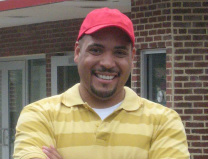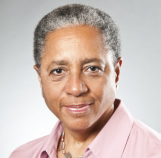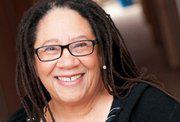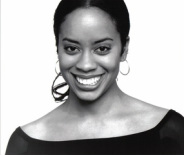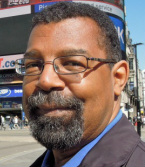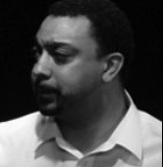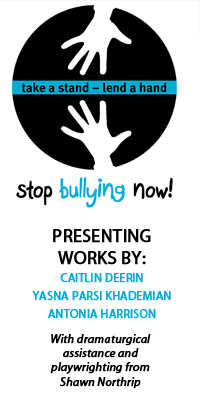 “Bullying comes in many forms. Helping our children learn ways to cope with bullying behavior is the best way to protect them. Adventure Theater MTC’s Anti-Bully plays are a great way to start the conversation with your kids.” Please join Adventure Theatre on September 28, 2013 at 7:00pm for the world premiere of their Anti-Bully Play. By kids, for kids. These imaginative, hopeful, funny, touching and compelling plays authentically portray the anti-bully message from a child’s perspective and words. Written by some of the DC region’s middle school students, these three plays illustrate the words of actual kids who have experienced or witnessed bullying. ATMTC will be presenting them free to the public for one night only. Talkback and reception to follow. Remember: October is National Bully Prevention Month Cost: This is a free event, but donations are accepted. Where: Adventure Theatre MTC in Glen Echo Park 7300 MacArthur Blvd, Glen Echo, MD 20812 RSVP: Michael J. Bobbitt at [email protected] Booking info: Want to book the tour for your own school or community organization? Call 301-588-7525 or visit Class Acts Arts online. In partnership with the Montgomery County Department of Recreation. Endorsed by the Montgomery County Police Department. Sponsored by Monument Bank. The program is endorsed by J. Thomas Manger, Chief of Police, Montgomery County Department of Police. 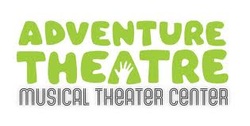 Adventure Theatre (founded in 1951) and Musical Theater Center (founded in 1986) merged into one organization in 2012. The combined entity is called Adventure Theatre MTC. Located in Glen Echo Park (Glen Echo, MD) and The Wintergreen Plaza (Rockville, MD), Adventure Theatre MTC (ATMTC) cultivates new generations of artists and life-long audiences by creating memorable theatrical productions and experiences and by providing young people the highest quality training in musical theater and theater. The ATMTC Academy offerings complement the National & State Fine Arts Standards of Learning, providing a challenging outlet for students to develop the skills necessary to be successful performers - including self-discipline, teamwork, problem solving, and self-confidence. ATMTC Academy Alumni have numerous Broadway, national tour, TV and film credits. ATMTC fosters collaborations and partnerships with local and national arts, humanities and civic organizations. These collaborations, which have been recognized locally, regionally, and nationally, help to ensure that all of our programming is diverse, affordable and accessible. Adventure Theatre MTC is a 501(c)(3) nonprofit organization.
0 Comments
Recently, I had the distinct pleasure of speaking with playwright Aditi Kapil about her life as a playwright and the inspiration for AGNES UNDER THE BIG TOP, now playing at Forum Theatre. In this candid, and insightful interview, Aditi speaks of her childhood in Sweden and of the first time she ever saw her work produced. She also speaks quite passionately about the impact and role of cultural identity in her writing and what it means to be an immigrant in the United States. Please enjoy. 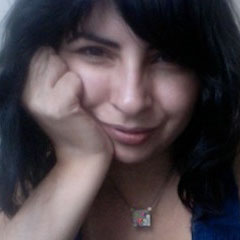 JACQUELINE LAWTON: Why did you decide to get into theatre? Was there someone or a particular show that inspired you? ADITI KAPIL: I didn’t see much theatre growing up in Stockholm, Sweden, probably because we couldn’t afford it. But there was this small theatre in town that did English-speaking productions, and when I was in high school (English-speaking IB program) we received tickets to their touring productions once a year. My mom and I went, we saw musicals the first two years, I think “Guys and Dolls” and “Carousel”, which was great. The 3rd year we went to see a German company’s English production of Sam Shepard’s “Fool for Love”. It was intense, I was maybe a little young, and I had one of those completely raw experiences that only happen when you have no idea what’s coming and it just catches you wide open. There’s an old guy mooing off to the side, what’s that about? And these two intensely complicated characters fighting and loving their way across the stage, a crazy backstory that I had to figure out for myself, and then Eddie is on the floor after getting kicked in the balls, and May takes off her bra and wipes herself down, and it’s exposed, practical, not at all lascivious, but hot at the same time, and I remember thinking “is this ok? Are we supposed to be here?” And I looked over at my mom to see if we’re embarrassed, if we’re leaving, if we have some sort of opinion that I can latch on to. She’s mesmerized. I looked around the full house, everyone was mesmerized, they had us. Because it was brilliant theater. And I remember thinking- theater is hot... theater is cool… I want a piece of this. That moment is probably what led to my taking an acting class as a blow-off in college, hardest class ever. JL: Next, tell me a little bit about your writing process. Do you have any writing rituals? Do you write in the same place or in different places? AK: I guess I’ll work anywhere. I’m city, so too much quiet is hard for me. Ambient noise, like a coffee shop, or listening to music, helps me tune out, and then tune in, gives me something to push back against maybe? And then when I come back and realize itunes dj has had me in children’s music for the past half hour and I didn’t notice, I know I went someplace. But then I also wonder how what’s going on around me or in my headphones is sneaking into the work in ways I don’t even realize. Oh, and I have to type, can’t write longhand, my handwriting is illegible, had I been born pre-typewriter I probably wouldn’t have been a writer. Had I been born pre-computers, I might have been a writer, but some shorter form, like haikus or something, because I’m also a shitty typist. One wonders how I get through the day. 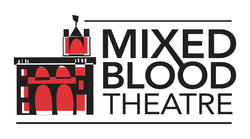 JL: Describe for me all the sensations you had the first time you had one of your plays produced and you sat in the audience while it was performed...what was different about the characters you created? How much input did you have in the directing of that work? AK: My first premiere experience was my play “Love Person” at Mixed Blood Theatre in Minneapolis, directed by the lovely Risa Brainin, wonderful cast, wonderful design team. I saw preview night on a Thursday, and then opening night on Friday. Opening night was pretty amazing, the show had settled just enough into its bones, the audience was open and receptive, I saw my story get communicated with so many layers of intricacy and individuality that I couldn’t possibly have created on my own, I watched the audience as closely as I watched the play and seeing them love my messy, confused, characters did that thing that fills your soul, made me feel less lonely in the world, feel like other people thought about these things too. That kind of connectivity is I think what theater is all about. Ok, so I wanted to say that first because, by contrast, preview night was really hard for me. This might be a consistent thing, because I feel like the exact same thing happened when I went to see “Agnes Under the Big Top” at Long Wharf, directed by the very amazing Eric Ting, again wonderful cast, wonderful design team. Preview night was choppy, I imagine the show wasn’t as tight as it was on opening, but I don’t think that was all of it, other people in the audience seemed to get it, to go on the ride with it. But I did not, I was not on the ride, I was resistant to the ride, and honestly the ride can’t have been that much different on the 2nd night when I did get on board, so part of that must have just been me. First off, I guess I have to accept that the thing on the stage is the play that has up until this moment lived exclusively in my mind. And in both cases I’d been part of rehearsals, but it’s not really the thing, it’s not theater, until there’s an audience in the room, for me that’s the moment I write to, the moment between the audience and the work. So when that moment hits for real, I seem to be wary and kinda resistant. And then there’s the fact that seeing your words on stage in front of people feels a whole lot like standing in a crowded room naked. It’s hard, it’s scary, it’s incredibly vulnerable. What if they laugh and point? So I guess I’m wary and resistant. To my own plays. On the first night, that is, by the second night my body and mind seem to have acclimated, and I can have an experience in the theater. 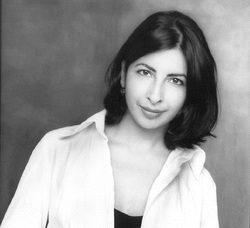 JL: What do you hope to convey in the plays that you create--what are they about? What sorts of people, situation, circumstances, do you like to write about? AK: I don’t know that it’s always purposeful, but themes of displacement, language, communication, identity, mythology, survival, tend to work their way into my plays. Little known fact, perhaps to anyone but myself and my dramaturg, nearly every play I’ve written contains the line “I am Indian!”, see if you can spot it. It’s like ‘where’s waldo’. Not so hard to work it in when Indian characters keep showing up in plays I never intended for them. Possibly I have something to prove in this area, I’ve been to India twice in my life, I speak no Indian languages. By contrast I’m fluent in Swedish and Bulgarian and feel deeply connected to those cultures. My Indian side I seem to be desperately grabbing at, often through my writing. I think my characters also tend to be fiercely unsentimental. And they tend to be people you don’t generally see in mainstream theater. Maybe what interests me most is taking characters who normally would be in the outskirts of mainstream narrative, and shifting the lens to position them center stage, move the mainstream narrative out to the margins, see what happens. Give my traditionally marginalized characters (be they deaf, immigrant, comic relief) the great tragedy to live, the great romance. I’m also very interested in writing complicated, difficult, women, and working with directors and actresses to put those women unapologetically into the public psyche. I feel like our public images and ideals of womanhood could use some shaking up, bit of an update. 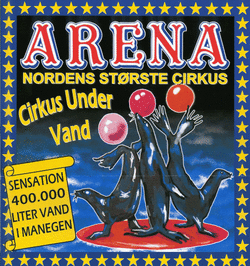 JL: Tell us about your play and what inspired you to write it. AK: “Agnes Under the Big Top, a tall tale” began as a 10-minute piece called “Cirkus Kalashnikov”. In 2004, I traveled to Sweden and Bulgaria with my then 2-year old daughter to visit family. In Bulgaria an uncle told me about the Kalashnikov factory that had closed in the town of Kazanlak, destroying the town’s economy. A few days later I took my daughter to this rickety little traveling circus, the Cirkus Arena, I spent the whole show watching this ringmaster with a cigarette hanging out of his mouth run the really pretty underwhelming show brilliantly with a well-placed “OPPA!” “BRAVO!” “DA!”. Later, in Sweden, my Indian father, who spent the last decades of his life driving Stockholm subway trains told me how he’d killed 3 people and 1 dog in his time in the subway. All of this worked its way through me on the 13-hour plane ride back to Minneapolis, and when we landed I wrote “Cirkus Kalashnikov”, a 10-minute piece about a former Bulgarian ringmaster turned subway driver in a US city. Then a couple of years later I read an article in the NY Times about how starlings came to the US, imported by an ornithologist and Shakespeare fan, and over the next century became this invasive chattering nuisance species, and I decided to try to expand the short play into a larger exploration of immigrant stories, so I added Agnes and Ella, loosely based on two women I worked with while I was in college (I spent my summers in Sweden as a home care worker) and a hybrid character loosely based on two Indian cousins named Happy. Oh and I gave my ringmaster a wife, named after my Bulgarian Aunt Roza. To be clear, while I stole extensively from family mythos, the play grew into its own thing and no single character has a direct real world correlation. The same way the ringmaster is a conflation of my uncle, the ringmaster I saw at the Cirkus Arena, and my father’s subway stories, every other character in the play became something very different from the original point of inspiration. 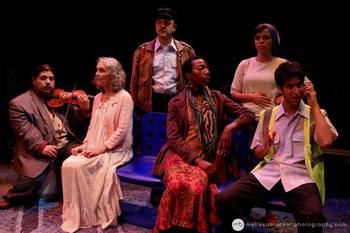 JL: What do you hope audiences are thinking about after experiencing this play? AK: Audiences have had such extreme reactions to this play… I guess my hope is that we see the beauty in the leap that so many people take daily into the unknown. I guess I’d love to see us celebrate the beauty in our failures, and in loving each other even when we’ve grown less beautiful, in fact isn’t it even more beautiful to love after the illusions are stripped away, however painful the stripping? Like many immigrants, my parents had big dreams when they took the leap. By the measure of those dreams, they failed, most do. The identity displacement that takes place when you move to another culture can be this huge bite out of the soul, and then I watched my mother go through a similar displacement when she went from being an extremely healthy woman to dying of cancer. I watched many of my patients, in my time as a homecare worker, rage and kick against being defined as ill or bedridden, against this identity imposed upon them by life, one they never signed up for. My mother felt like she had somehow failed in her battle against cancer, many of my patients felt they had somehow failed at life, and I guess I grew to resent the idea of ‘winning’ as the purpose of life. I’d like to celebrate the courage it takes to grasp at life, to leap, to keep telling your stories, to keep reaching for the brass ring, to touch each other even when you feel invisible. That’s beautiful to me. That’s uplifting. JL: How has the community where you work and live addressed issues of race and gender parity? How has this particular issue impacted you and your ability to get your work produced on the main stages? AK: I’m very fortunate in that I, in Minneapolis, have an artistic home at Mixed Blood Theatre. Mixed Blood is this amazingly progressive theater with really high artistic values, and a commitment to putting marginalized stories center stage, who in a recent act of radical hospitality stopped charging for tickets a couple of years ago, which has really revolutionized our audiences. It’s a pretty amazing place to premiere work, allows for a kind of dialogue that is hard to find anywhere else. Our community has all the same issues as many others, we are constantly in a debate about how our major theaters can be leaders in a dramatic discourse that reflects our place and time in all its diversity, but for my own work I feel pretty well cocooned from all that in that I have this phenomenal theater premiering my work. JL: What excited you about taking part in Forum Theatre’s 10th Season? AK: I’m so excited about all the plays in this season, and so ridiculously honored to be included! Theater to me is a dialogue with ones community that ideally starts in a room with a group of people having an intense live experience, and then trickles out from there, and the dialogue represented by Forum’s 10th season excites me so much. I’m excited to be a strand in that dialogue, but also really excited for the artists and audiences who will be connecting over these ideas across an entire season. JL: What advice do you have for up-and-coming playwrights? AK: I can tell you what I tell students. Develop your own taste through voracious intake of art, aspire to create what you most want to see in the theater right now, and then try to make that. Try really hard, hold on to the vision in your mind, and don’t quit until your artistry is equal to your imagination. And along the way don’t be afraid to fail a lot. And the upside is that theater is a collaborative art form, so you won’t be on your own trying to figure it out. But yes, it’s that hard, so let’s not pretend it’s not  JL: What’s next for you as a playwright? Where can we follow your work? AK: I have a trilogy based on the Hindu Trinity of Brahma, Vishnu, and Shiva that we’re premiering in repertory at Mixed Blood Theatre in October. Each play displaces a deity into a contemporary immigrant in the west, and each play is in a different style. The Brahma play is “Brahman/I, a one-hijra stand-up comedy show” and it’s literally a stand-up routine. The Vishnu play is “The Chronicles of Kalki” about a girl who may or may not be the final avatar of Vishnu come to save the world from demons and evil, and it’s more of a comic book style girl gang thriller. The Shiva play is called “Shiv”, this is the one where I try to get into post-colonial residue more, it has more of a memory play quality. It’s a pretty epic undertaking, and I’m so excited about the artistic team gathered around the project, doing such beautiful work to get such a huge beast up and running. I try to keep my website updated-www.aditikapil.com, I’m sporadically active on twitter @AditiBKapil 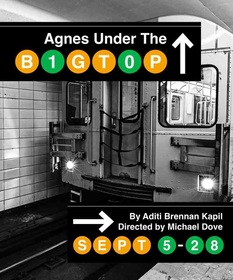 AGNES UNDER THE BIG TOP Written by Aditi Brennan Kapil Directed by Michael Dove Featuring Joy Jones, Annie Houston, Nora Achrati, Ed Christian, Jon Jon Johnson, and Jason Glass. September 5-28, 2013 Click here for a full list of performance dates and here for ticketing information About the Play To the music of the subway, six lives intersect in this comic adventure about immigrant life in America. A Liberian nurse, a Bulgarian one-time ringmaster and his wife, an Indian subway driver trainee, a nomadic busker, and a bedridden woman pursue dreams, peace, and a place in this strange new world. HAPPENING TODAY: 2:00pm - Matinee of Agnes Under the Big Top (Click here for ticket information) 3:30-4:00pm - Break 4:00-6:30pm - Town Hall on Diversity and Inclusion in Theatre If you're unable to attend, follow the conversation on Twitter with #ForumTH For questions, click here to contact Artistic Director Michael Dove. Saturday, September 21, 2013 Forum Theatre @ Round House Silver Spring 8641 Colesville Road, Silver Spring, MD 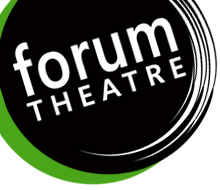 Forum Theatre produces adventurous, relevant, and challenging plays from a diversity of voices that inspire discussion and build community -- and that are accessible, affordable, and entertaining. Since Forum Theatre’s inception, we have aimed to be both the home for stories that provoke discussion and the place to host that discussion. We want our plays to be a conversation with the audience. We tell stories about who we are as a local, national, and global community. So what is a Forum show? That’s never been the easiest thing to describe, but a few things tend to always be true: A Forum show asks big questions. A Forum show is intricate and challenging, but has a big heart at its center. And a Forum show gives you something to think about and a lot to talk about. 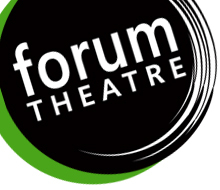 Hey Folks! Tomorrow, September 21st, from 4:00pm to 6:30pm, Forum Theatre is convening a Town Hall on diversity and inclusion in theatre. I'm serving as a Breakout Session Facilitator alongside Jiva Manske (Educator and Organizer for Human Rights & Social Justice) and Jordana Fraider (Projects Coordinator at (e)merge art fair). Here's what they have to say about it and why you should attend and participate: As Forum celebrates its 10th season, we are looking back not only on what we have done, but on how we move forward. For the past few years, Forum has worked to address issues of gender, race, and class inequality through our art. We have done so in order to better realize our mission to“tell stories about who we are as a local, national, and global community.” The purpose of this Town Hall will be to gather our stakeholders--artists, audience members, and neighbors--around the idea of making diversity and inclusion essential core values of Forum Theatre. Essentially, we have decided to explore changes in our mission and practices of the organization and we need you to be a part of this conversation. It is only by actively engaging with and listening to our community that we can accomplish true, lasting and meaningful change within our organization. About the Town Hall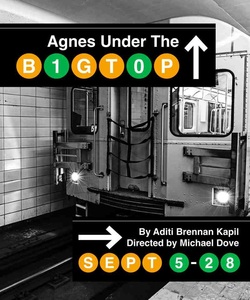 The day will begin with a matinee performance of Agnes Under the Big Top and then transition into a variety of action-based conversations culminating in a final gathering to state next steps. Forum Theatre believes that our art is a reflection of our community and that a multitude of voices are necessary to truly grapple with the issues of today. We'd like to make sure that all of the right voices are being heard and hope you can join us. The schedule: 2:00pm - Matinee of Agnes Under the Big Top (Click here for ticket information) 3:30-4:00pm - Break 4:00-6:30pm - Town Hall If you're unable to attend, follow the conversation on Twitter with #ForumTH For questions, click here to contact Artistic Director Michael Dove. Saturday, September 21, 2013 Forum Theatre @ Round House Silver Spring 8641 Colesville Road, Silver Spring, MD AGNES UNDER THE BIG TOP: A TALL TALE by Aditi Brennan Kapil Directed by Michael Dove Featuring: Joy Jones*+, Annie Houston+ (bobrauschenbergamerica), Nora Achrati+ (Church), Ed Christian (The Language Archive), Jon Jon Johnson, and Jason Glass. Photos by Melissa Blackall. Happening Today on Twitter - #ForumTH Today, September 20th from 2:00pm to 3:00pm (EST), Forum Theatre will be hosting a national and global conversation about diversity and inclusion ahead of this Saturday's Town Hall at the theatre. Artistic Director Michael Dove will moderate the conversation and all are invited. This open-access discussion will focus on what efforts are being done in the theatre field to promote audience/artist/aesthetic diversity, the ways we are making our theatres more inclusive, and ways that we can measure that progress. The twitter conversation will help provide broad context to the town hall event on Saturday which will focus on Forum's specific local community and actions moving ahead. To join the conversation, search for #ForumTH on twitter and be sure to include #ForumTH in your messages and responses. 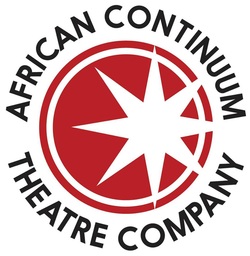 Please join African Continuum Theatre Company for A Blaze of Horns: African American Voices in Briefs, an evening of 10-minute play readings by six of your favorite local playwrights. Hosted by Patrick Washington of the Poem-Cees, playwrights include Michael J. Bobbitt, Paige Hernandez-Funn, Caleen Jennings, Tom Minter, Jennifer L. Nelson, and Malcolm Pelles. A Blaze of Horns Saturday, September 21, 2013 at 7:30 pm Atlas Performing Arts Center 1333 H Street NW Suggested $15 Donation To learn more about this event and the featured plays, please enjoy these wonderful and insightful director interviews! Director Michael J. BobbittJACQUELINE LAWTON: As a director, what excited you about taking part in African Continuum Theatre Company’s A Blaze of Horns: African American Voices in Brief? MICHAEL J. BOBBITT: I am always excited to be a part of a new initiative. More than that, whatever Thembi Duncan asks me to do, the answer is always "yes". And, more than that, any initiative that can celebrate the voices of African American Playwrights is something that I want to be a part of. JL: Whose play are you directing? Why is he or she an essential voice in the American Theatre? MJB: I am excited to have the chance to direct A DEAD MOUSE ON YOUR DOORSTEP by Malcolm Pelles. Malcom has such a unique and accessible voice. He is a skilled and experienced writer whose work needs to be heard as much as possible. JL: What do you hope audiences will walk away thinking about after experiencing this play? MJB: I hope a lot of laughs, mostly. But, underneath it all - passion, not matter what, is a great thing and that passionate people should be revered, even when questioned. Without passionate people, we stop evolving. JL: What are you working on next? Where can we follow your work? MJB: This year is a year to focus on advancing Adventure Theatre MTC as an institution and long term strategic planning, so my outside gigging is less than usual. I have a bunch of choreographing gigs - Good Night Moon at Adventure Theatre, Scapin at Constellation and Spelling Bee at Ford's. No directing gigs this year, but I'm happy for a break. 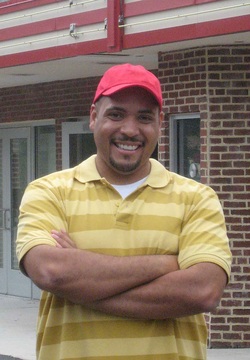 Michael J. Bobbitt is the Producing Artistic Director of Adventure Theatre MTC and has directed, choreographed and performed at many theatres in the DC region, including Arena Stage, Ford’s Theatre Society, The Shakespeare Theatre Company, Signature Theatre, Metro Stage, Rorshach Theatre Company, Studio Theatre, Woolly Mammoth Theatre Company, Center Stage, Roundhouse Theatre, The Music Center at Strathmore, The Kennedy Center, The Helen Hayes Awards and the Washington National Opera. His national and international credits include the NY Musical Theatre Festival, Mel Tillis 2001, La Jolla Playhouse, Jefferson Performing Arts Center, and 1996 Olympics. He studied creative writing and music at Susquehanna University and theater and dance at The Washington Ballet, The Dance Theatre of Harlem, The American Musical and Dramatic Academy and NY University’s Tisch School of the Arts (Cap 21). He is a member of the Dramatist Guild of America and the Society of Stage Directors and Choreographers. Director Thembi DuncanJACQUELINE LAWTON: As a director, what excited you about taking part in African Continuum Theatre Company’s A Blaze of Horns: African American Voices in Brief? THEMBI DUNCAN: I love the challenges of the 10-minute play format -- you have to tell an entire story in a very short amount of time, so it's a great way to practice succinctness and restraint. As a director, I see myself as the personal valet of the playwright. The playwright takes my arm, I walk him in, sit him down and slip an ottoman under his feet while he tells his story. I am there to support him, but also to engage my own aesthetic with his work and see what becomes of it. JEL: Whose play are you directing? Why is he or she an essential voice in the American Theatre? TD: I'm directing Michael Bobbitt's Redskins v. Rockettes. Michael has a wonderful ear for provocative, engaging dialogue, which creates such rich conversations between his characters -- but then the artistry of his wordsmithing heightens the work to a theatrical pitch. Plus, he's outrageously funny. He can take something potentially sad and make it hilariously optimistic. American Theatre needs more optimism in the face of adversity -- particularly from within African-American stories. JL: What do you hope audiences will walk away thinking about after experiencing this play? TD: I want audiences to walk away from this play with a renewed respect for all forms of selfhood. Each of us has the right to define and live within our own identity(ies), and we must allow others that same right. We don't have to be cut from the same cloth to find common ground, but it requires movement from both sides in order to meet in the middle. JL: What are you working on next? Where can we follow your work? TD: I likely won't be directing for the next few months, but if you want to see what's next for me, just go to www.african-continuum.org! 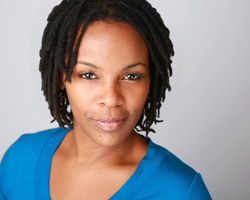 Thembi Duncan has performed as an actor in the region for almost fifteen years. As an emerging playwright, she penned Gridiron: Adventures from the Sidelines,for the Active Cultures 2011 Sportaculture Play Festival, which was re-produced in the Best of Sportaculture Festival later that year. Champagne, her 15-minute play commissioned by The Brave Soul Collective, was performed for National Black AIDS Day 2012, the 2012 National Black Theatre Festival, and the 2012 International AIDS Conference. She wrote Coop in the Yard for Active Culture's Govaculture offering in the Atlas Intersections Festival, and BLUEP for Rorschach Theatre's Klexography Festival. Mon Chaton is her first full-length play, which was first developed in 2009 under the tutelage of Dr. Walter Dallas at the University of Maryland, and has had successful staged readings in D.C. and Virginia. Her cross-gendered adaptation of the cult classic film Whatever Happened To Baby Jane?, called WTF Happened To Baby Sister?, will receive a workshop performance in February 2014 as part of the Mead Theatre Lab Program. Thembi serves as Lead Teaching Artist at historic Ford’s Theatre, and also serves as Producing Artistic Director of African Continuum Theatre Company. Director Angelisa GillyardJACQUELINE LAWTON: As a director, what excited you about taking part in African Continuum Theatre Company’s A Blaze of Horns: African American Voices in Brief? ANGELISA GILLYARD: I am always excited to work with African Continuum Theatre Company (ACTCo) as it is an established and critical voice of the African diaspora in DC theater. This particular program is especially valuable because it will introduce the work of playwrights who may be previously unknown to the audience. So often when we think of African American playwrights, the same big names come to mind – August Wilson, Lorrain Hansberry, Suzan Lori-Parks, etc. I think it is important to remind the community at large that there are still new voices telling important stories. These new voices will perhaps become the next set of African American writers to add to the African American theater canon. JL: Whose play are you directing? Why is he or she an essential voice in the American Theatre? AG: I am directing Undisclosed by Caleen Sinnette Jennings. I have actually directed other work by Ms. Jennings, including Unlearned and Uncovered for ACTCo’s Off the Circuit Troupe. A common theme in her plays is the emotional support black women give to each other, often while simultaneously navigating and surviving their own personal trials. Undisclosed is particularly poignant and timely as it puts faces to the scandals we hear on the news about the prevalence of sexual violence perpetrated against women while serving in the military. Black women in the media today are often portrayed as either the perfect woman who always has it all together (e.g. Claire Huxtable) or as mere objects and props (e.g. just about any music video out there now). It is not often enough that we see black women acting out of compassion for their fellow women and passion for justice. Ms. Jennings’ voice is essential to American Theatre because she presents black women’s stories as a part of American history, not separate from it. JL: What do you hope audiences will walk away thinking about after experiencing this play? AG: I hope that audiences walk away with three main ideas from this play: First, is the depth and passion of the sisterly love, dedication and commitment that is exhibited by the two military women; second is the realization that every woman, every person, has a story that should be told and witnessed; and third is that for every seemingly unreal scandal we see on the news, there is someone actually living that painful nightmarish reality. We have a responsibility to make sure that justice prevails. JL: What are you working on next? Where can we follow your work? AG: I just finished choreographing an opera for The In Series, Mozart’s Abduction from the Seraglio, which opened this past Sunday (9/8) and runs through September 22. I will also be working with ACTCo again for the Intersections Festival next year and I will be choreographing a production of Ain’t Misbehavin’ in Maryland next spring. 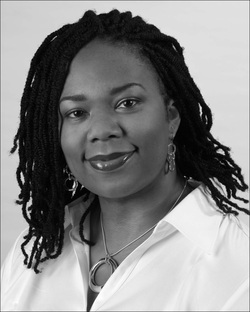 Angelisa Gillyard is an emerging director and choreographer in Washington, DC. Angelisa has choreographed and directed operas, musicals, readings and plays for African Continuum Theatre Company, The In Series, Studio Theatre, Arena Stage, Montgomery College, The Inkwell and Active Cultures Theatre. Her work has also been seen in local festivals including the Kennedy Center Page to Stage Festival, Capitol Fringe Festival, Smithsonian Folklife Festival, and Arena Stage’s Edward Albee Festival. Some of her favorite musicals she has choreographed include Once on This Island, The Wiz, Purlie, and Dreamgirls. She holds a BS from Spelman College, MBA from GA Tech and PhD in business from The Ohio State University and has taught business at several universities in the area for the past ten years. Director Scot ReeseJACQUELINE LAWTON: As a director, what excited you about taking part in African Continuum Theatre Company’s A Blaze of Horns: African American Voices in Brief? SCOT REESE: I have been a part of ACTC since I moved to the DC Metro area in 1996. I call ACTC my artistic home. I was fortunate to direct our first production at the new Atlas Theatre under the Artistic direction of Jennifer Nelson and now am carrying on the legacy with the new Artistic Director - Thembi Duncan. Its also thrilling in that I've directed Thembi as an actor and when she returned to school at UMD, I was able to work with her as a teacher. As a director, I am fortunate to work on a wide variety of material - but what excites me most is working on new plays. My job as a director is three-fold: to interpret, collaborate and communicate. I am in the unique position of getting this new play from the writer - collaborating with the writer to understand the material - interpreting the material to work on in rehearsal with actors and writer, and then communicating our work to an audience. Its a joy to see a work that hasn't been done before go from page to stage. JL: Whose play are you directing? Why is he or she an essential voice in the American Theatre? SR: I'm honored to be directing Jennifer Nelson's play - Talking with the Ex. Jennifer IS American Theatre! She was my introduction to the DC arts scene. She welcomed me and made me feel included an essential. She has worked in the theatre for over 30 years (she started when she was a baby!) and has worked as an actor, administrator, educator, playwright, producer and director. She was President of the League of Washington Theatres, Artistic Director for African Continuum where she produced and directed numerous plays and world premieres. But what strikes me most is Jennifer's vision. She began her career in DC with he Living Stage Theatre Company, which was the community outreach program of Arena Stage dedicated to making art that would make a difference. Jennifer MAKES a difference! JL: What do you hope audiences will walk away thinking about after experiencing this play? SR: This play is about relationships and listening. Anybody that has been in a relationship will enjoy this story. And anybody that has had an EX will understand it on another level. I don't want to give away the plot - but Jennifer has captured a unique place and time in a relationship and how relationships continue - even when people aren't living together. You'll walk away thinking about how you listen and how you feel you aren't listened to. JL: What are you working on next? Where can we follow your work? SR: Thanks for the plug! On Friday, September 6 the Clarice Smith Performing Arts Center’s will kick off its 2013–2014 season with a new incarnation of The Movement Revisited, by jazz bassist Christian McBride. He composed a four-part suite dedicated to four major figures of the Civil Rights Movement: Rosa Parks, Malcolm X, Muhammad Ali and Dr. Martin Luther King Jr. I’ll be performing the part of Malcolm X alongside civil rights activist and artist Harry Belafonte, Dr.Ysaye M. Barnwell (of Sweet Honey in the Rock), The Christian McBride Big Band and Washington DC’s Heritage Signature Chorale. It should be quite a night and honored to be in such prestigious company! 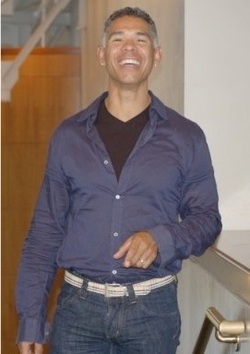 Scot Reese is a professor in directing, Black theatre, and musical theatre. Professional theatre credits include productions from Los Angeles to New York. Television credits include daytime dramas, situation comedies, variety specials, commercials, and an Emmy Award in performance. Recent credits include premiere’s of A Cricket in Times Square, Colossal, Embrace, Etudes for the Sleep of Others, and Blues Journey at the Kennedy Center, the premiere’s of The Waiter at Arena Stage, and 24/7, 365 at the Theatre of First Amendment, Dr. of Alcantara at Strathmore Music Center, Once On This Island at the Round House Theatre, Pretty Fire for the African Continuum Theatre Company, and Barefoot in the Park (with Laura Linney and Eric Stoltz) at LA Theatre Works. Director Kenyatta RogersJACQUELINE LAWTON: As a director, what excited you about taking part in African Continuum Theatre Company’s A Blaze of Horns: African American Voices in Brief? KENYATTA ROGERS: I have been a fan of African Continuum Theatre Company since I moved to the area 15 years ago. African Continuum has been a regional leader its innovative play selection and play cultivation, its reputation for audience development, and its commitment to hiring and showcasing talented local artists. This American Voices project will provide a resurgent African Continuum an opportunity to continue this proud tradition. JL: Whose play are you directing? Why is he or she an essential voice in the American Theatre? KR: The very talented Tom Minter’s play COLLECTIONS OF A WORKING MIND. This is my first time hearing and working with Mr. Minter’s work and I was blown away from first read. The play is simple in its construction but unusual in its subject, complex it’s layering of meaning, and refreshing in its precision and careful construction of its characters. JL: What do you hope audiences will walk away thinking about after experiencing this play? KR: I hope that audiences new to the challenges that this play provides and that those who have read and been witness to this kind of non-realistic work are excited and/or reinvigorated by the power of image, the power of text, power of context, and the power of silence. I hope they walk away with a sense of wonder about the way we re(member) our past and recognize that we possess tools within us that both protect us from the facts that can overwhelm while revealing to us the truths we seek. JL: What are you working on next? Where can we follow your work? KR: I will be directing and cultivating a new project by local playwright and theatre artist Baye Harrell in October and directing the very funny Bruce Norris play THE UNMENTIONABLES for Montgomery College in November. I’ll be back onstage as performer in the Round House Theatre Production of TWO TRAINS RUNNING in April 2014. See you in the theatre! 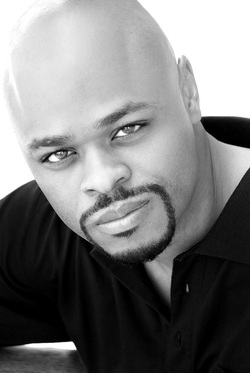 KenYatta Rogers is a local director, actor, and educator who is proud to call DC his artistic home. He proudly returns to African Continuum Theatre after having directed or acted in over 10 productions for the company. He has also directed full productions for New Galaxy Theatre Group, Tribute Productions, Touchstone Theatre, The InSeries, Source Theatre Festival, University Pittsburgh, Howard University, Point Park College, and Montgomery College. He has also directed staged readings for Lincoln Theatre, Essential Theatre, Woolly Mammoth, Gala Hispanic Theatre, and Theatre J. As an actor, Mr. Rogers has performed in regional houses such as Round House Theatre, Everyman Theatre, Woolly Mammoth Theatre, Forum Theatre, Arena Stage, Ford’s Theatre, Folger Theatre, Olney Theatre, Theatre Alliance, City Theatre, Trustus Theatre, and Shakespeare and Company. He earned his BA from Clark Atlanta University and his MFA from the University of Pittsburgh. Currently, he is a member of the theatre faculty at Montgomery College and a member of Round House Theatre’s Artists’ Roundtable. To Kasai, his heart, Mecca, his soul and Michelle, his all. Director Deidra StarnesJACQUELINE LAWTON: As a director, what excited you about taking part in African Continuum Theatre Company’s A Blaze of Horns: African American Voices in Brief? DEIDRA STARNES: Two of the most exciting aspects of taking part in African Continuum Theatre Company's A Blaze of Horns: African American Voices was being able to direct for the theatre company that launched my DMV career and to collaborate with long time friend and colleague, Thembi Duncan. JL: Whose play are you directing? Why is he or she an essential voice in the American Theatre? DS: I am directing North (7th Street Echo) by Paige Hernandez. Paige is an amazing trend setter in the Hip Hop world of theater. She creates a viably aesthetic world that is comprehensible by all audience members and has the ability to bridge generational gaps of tradition JL: What do you hope audiences will walk away thinking about after experiencing this play? DS: I prefer not to have expectations of what an audience member will walk away with as each one is unique. But at the very least, I would hope they walk away with new information that informs their opinions as they move forward throughout their respective journeys. JL: What are you working on next? Where can we follow your work? DS: I am performing in a reading of the Container at Center Stage and then in The Twelve Days of Christmas at Adventure Theatre. 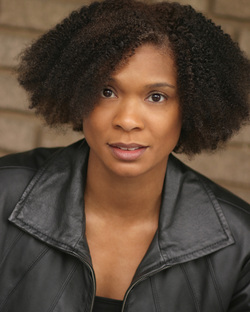 Deidra Starnes is thrilled to be making her African Continuum Theatre directing debut. A theatrical educator throughout the DMV, her directing credits include a reading of Mary Stone Hanley’s Street Life for the DC Theatre Festival. David Toney’s Soul Collector at Port City Playhouse,” Mary Stone Hanley’s The Name Game for the DC Theatre Festival, Once on This Island, Jr. and 101 Dalmatians for The Theatre Lab Summer Musical Camp for Tweens. She last appeared in the Shakespeare Theatre Company’s production of Much Ado about Nothing. Her African Continuum Theatre credits include; 24, 7, 365, Intimate Apparel (Helen Hayes Award), A Raisin in the Sun, The Gingham Dog, I Have before Me a Remarkable Document…., Two Trains Running, Personal History, and Spunk. Other appearances include Invisible Man (Helen Hayes Award), Charlotte’s Web, Passing Strange, In the Red and Brown Water, Radio Golf, King Lear, Doubt and for colored girls who have considered suicide when the rainbow is enuf, directed by Ntozake Shange. Her film credits include Chasing Refuge, Nocturnal Agony, and Ladder 49. She holds a BA in Theatre from the University of Maryland and an MFA in Drama from the University of Connecticut. 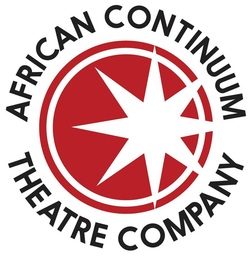 About African Continuum Theatre Company The African Continuum Theatre Coalition was created in 1989 as a service organization to assist the dozen or more small black community theatres in the improvement of the quality and visibility of their work. In 1995, the Coalition transitioned into a theatre company, with a primary mission to produce professional, high-quality programming for the general public that preserves and highlights African-American history and culture. African Continuum Theatre Company has presented over 35 fully-produced, main-stage plays, seven of which were world premieres, along with numerous public readings of new works by playwrights of color. African Continuum Theatre Company is committed to providing new and traditional performing art forms from main-stage productions to community engagement programs. Its focus and strength is engaging the community with exciting and meaningful theatrical productions, educational programs, partnerships, and volunteer opportunities that bring us to the larger community. African Continuum has garnered recognition for its artistic endeavors and leadership from the Cultural Alliance of Greater Washington and other agencies, including 16 Helen Hayes Awards nominations, 3 Helen Hayes Awards, the Washington Post Award for Distinguished Service to the Community, and the Mayor’s Arts Award. 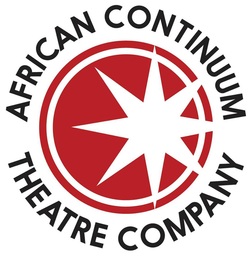 Please join African Continuum Theatre Company for A Blaze of Horns: African American Voices in Briefs, an evening of 10-minute play readings by six of your favorite local playwrights. Hosted by Patrick Washington of the Poem-Cees, playwrights include Michael J. Bobbitt, Paige Hernandez-Funn, Caleen Jennings, Tom Minter, Jennifer L. Nelson, and Malcolm Pelles. A Blaze of Horns Saturday, September 21, 2013 at 7:30 pm Atlas Performing Arts Center 1333 H Street NW Suggested $15 Donation To learn more about this event and the featured plays, please enjoy these lively playwright interviews! Playwright Michael J. BobbittJACQUELINE LAWTON: As a playwright, what excited you about taking part in African Continuum Theatre Company’s A Blaze of Horns: African American Voices in Brief? MICHAEL J. BOBBITT: There are several things that excited me about this project. 1.) Being a part of this community of voices that need to be heard. 2.) Doing whatever Thembi Duncan asks me to do. 3.) Being able to see this play again. JL: What is the name of your play and what is it about? MJB: The play is called Redskins v Rockettes. This possibly autobiographical comedy is about a dramatic teenaged boy who would rather wear play dress up than play football prepares for an afternoon game with his dad. They learn to understand each other. JL: Why should folks come out and see A Blaze of Horns? MJB: I am excited about the new stories that will be told. So often our stories are reduced to the turmoil of race and the plays appearing in this festival are about all kinds of experiences. it's very important. It allows us to understand each other more. AND, this is a great new initiative under the auspices of ACTCO's new leadership. JL: What are you working on next? Where can we follow your work? MJB: Playwriting is only a hobby for me. I do love to write and am lucky to have had a few things published and produced. My children's musical, Bob Marley's THREE LITTLE BIRDS, commissioned and premiered by Adventure Theatre MTC will be transferring Off Broadway to the New Victory Theatre on 42nd Street in February 2014. I am also working on a new adaptation of Jim Davis' comic strip, Garfield. 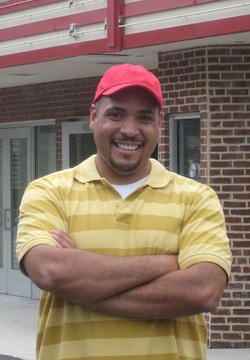 Michael J. Bobbitt is the Producing Artistic Director of Adventure Theatre MTC and has directed, choreographed and performed at many theatres in the DC region. He studied creative writing and music at Susquehanna University and theater and dance at The Washington Ballet, The Dance Theatre of Harlem, The American Musical and Dramatic Academy and NY University’s Tisch School of the Arts (Cap 21). He is a member of the Dramatist Guild of America and the Society of Stage Directors and Choreographers. As a writer, his work has been accepted in the NYC International Fringe Festival, The New York Musical Theatre Festival and has received grants from the National Alliance for Musical Theatre’s Producer-Writer Initiative, The Creative Projects Grant from the Arts and Humanities Council of Montgomery County, Maryland State Arts Council and the Puffin Foundation. Michael’s works include Bingo Long and the Traveling All-Stars and Motor Kings, The Yellow Rose of Texas, Say It Ain’t So!, The Stephen Schwartz Project, Going The Distance, Tigers, Dragons and Other Wise Tales, How Old is a Hero?, Bob Marley’s Three Little Birds, Redskins vs. Rockettes, and revisions of Big, the musical – TYA and Rudolph the Red-Nosed Reindeer. Playwright Paige HernandezJACQUELINE LAWTON: As a playwright, what excited you about taking part in African Continuum Theatre Company’s A Blaze of Horns: African American Voices in Brief? PAIGE HERNANDEZ: Omgoodness, I don't know where to start! Working with African Continuum Theatre…being in the presence of so many other amazing writers, directors and actors…..and a platform to display strong AA voices in American Theatre. JL: What is the name of your play and what is it about? PH: The name of play is 7th Street Echo. It follows Candela who tries to break into the music scene as a female drummer, having recently lost her father. 7th Street Echo touches on family, triumph, breaking stereotypes and of course…the love of go go music. It's a very honest piece set in the heart of Washington DC. JL: Why should folks come out and see A Blaze of Horns? PH: I know for a fact that the audience is going to be blown away by these pieces. You truly get to experience a sampler of some DC's brightest and most talented artists. JL: What are you working on next? Where can we follow your work? PH: I'm still touring my one-woman show, Paige in Full. The next stops in the fall are in Nashville and Baton Rouge. Other tour stops through 2014 include Des Moines, Austin, Nashville and Brooklyn. I'll continue my national residencies with Wolf Trap as well as training and professional development workshops in Charlotte, Poughkeepsie and here in the DMV area. As a writer/director/choreographer, I'm writing a new piece, the Nayika Project, with classical Indian dancerChitra Kalyandurg. Nayika Project will premiere in the spring of 2014. I'm choreographing all over in many different pieces including Olney Theatre's spring production of The Piano Lesson. As performer I'll be starring in Shape of a Girl at the Wharton Arts Center in Michigan in November and in the spring, I'll be Cinderella in Imagination Stage's Cinderella: The Remix, written by a dear friend and colleague of mine, Psalmayene 24. Stay up to date with www.paigehernandez.com 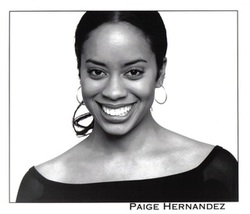 Paige Hernandez is a multifaceted artist, who is known for her innovative fusion of poetry, hip hop, dance and education. As a master teaching artist, Paige has taught throughout the country, to all ages, in all disciplines. To date, she has reached over 10, 000 students, from Pre-K through college, in over 100 residencies, workshops and performances. She has been recognized in many organizations including the Wolftrap Foundation for Early Learning and Arena Stage where she was awarded the Thomas Fichandler award for exceptional promise in theater education. As an actress, Paige has performed on many stages including DC: Arena Stage, Folger Theatre, The Kennedy Center , Fulton Theatre(PA), Ohio Theatre (NY), Manship Theatre(LA), Paramount Theatre (TX) and many others. As a critically acclaimed dancer, Paige's choreography has been seen all over the country and recently in The Kennedy Center’s American Scrapbook and Knuffle Bunny. As a hip hop education advocate, Paige has shaped various educational workshops, including Props for Hip Hop at Arena Stage and Keep it Moving, at Wolftrap. With her company B-FLY ENTERTAINMENT, Paige has toured her children’s show Havana Hop and her one woman show, Paige in Full: A B-girl’s Visual Mixtape throughout the country. www.paigehernandez.com Playwright Caleen Sinnette JenningsJACQUELINE LAWTON: As a playwright, what excited you about taking part in African Continuum Theatre Company’s A Blaze of Horns: African American Voices in Brief? CALEEN SINNETTE JENNINGS: I've been around since the founding of ActCo. ActCo has produced and supported my work over many years. It is always a thrill and an honor to be invited to share work through ActCo. In A Blaze of Horns, I'm in the company of some wonderful artists. I have tremendous respect for Thembi's vision and managerial skills. This is a wonderful way to jump out there and say, "Hey, check us out now." JL: What is the name of your play and what is it about? CSJ: Back in 2007, long before it was reported in the media, I read a story online about women soldiers in Iraq who feared rape and molestation by soldiers in their own units. One of the strategies they had to adopt was not drinking water after 6 pm so that they would not have to use the latrines at night. These are women living in the DESERT! I thought about women who had left husbands, children at home, to fight under very dangerous circumstances, against an enemy who was unpredictable AND who had to fear the men on their own team -- the men who were supposed to be their comrades in arms. I was blown away by that. And still nothing substantive has been done to stop it. I wrote my play 2007 in response to that article. Undisclosed is about female soldiers who have decided to take action to protect themselves. JL: Why should folks come out and see A Blaze of Horns? CSJ: This is African American theatre at its finest. The playwrights, directors and actors involved are skilled, seasoned professionals who call D.C. their artistic home and who seek inspiration from their hometown audiences. ActCo is a very special organization which has been under the stewardship of three dynamic women who have fought to keep it alive and thriving. ActCo audiences are sophisticated and intelligent. An evening at an ActCo performance is inspirational and thought provoking. JL: What are you working on next? Where can we follow your work? CSJ: I am a member of the Welders Playwright's Collective. The Collective will be producing my play, "Not Enough Lifetimes" in the 2014-2015 season at the Atlas. Right now, I'm in rehearsal for an original children's play called Steamystery, about S.T.E.A.M. (Science Technology Engineering Art Math) which will be done at American University in early October. You can follow my work on Facebook. 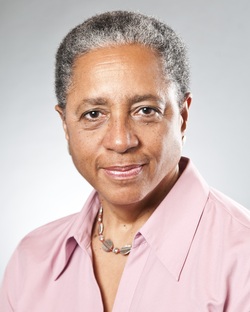 Caleen Sinnette Jennings is Professor of Theatre at American University in Washington, D.C. She received the Heideman Award from Actor’s Theatre of Louisville for her play Classyass, which was produced at the 2002 Humana Festival and has been published in five anthologies. She is a two-time Helen Hayes Award nominee for Outstanding New Play. In 2003 she won the award for Outstanding Teaching of Playwriting from the Play Writing Forum of the Association of Theatre in Higher Education. In 1999 she received a $10,000 grant from the Kennedy Center’s Fund for New American Plays for her play Inns & Outs. Her play, Playing Juliet/Casting Othello was produced at the Folger Shakespeare Theatre in 1998. In 2012, Ms. Jennings’ play, Hair, Nails & Dress, was produced by Uprooted Theatre Company of Milwaukee, and by the D.C. Black Theatre Festival. Her play, Uncovered, is in the 2011 Eric Lane and Nina Shengold anthology, Shorter, Faster, Funnier. Dramatic Publishing Company has published: Chem Mystery, Elsewhere in Elsinore: the Unseen Women of Hamlet, Inns & Outs, Playing Juliet/Casting Othello, Sunday Dinner, A Lunch Line, and Same But Different. Ms. Jennings received her B.A. in Drama from Bennington College and her M.F.A. in Acting from the N.Y.U. Tisch School of the Arts. Playwright Tom MinterJACQUELINE LAWTON: As a playwright, what excited you about taking part in African Continuum Theatre Company’s A Blaze of Horns: African American Voices in Brief? TOM MINTER: Being asked by Thembi. It is wonderful support to have a colleague reach out and ask for my voice in this unique mix of talents. I also love the concept of “a blaze of horns”, as if calling everyone to this storytelling opportunity. JL: What is the name of your play and what is it about? TM: The name of my play is Collections of a working mind, and it relates to processing the real world – an adult world, by a child. JL: Why should folks come out and see A Blaze of Horns? TM: Easy! Six talented authors, weaving their different characters through nimble actors, presenting in a forum of imagination – live! I’ll speak for myself and say, I wouldn’t want to miss that! JL: What are you working on next? Where can we follow your work? TM: Presently I’m working on a commissioned piece, creating a play that threads through resonant moments from the lives of Duke Ellington, Ethel Waters and Ella Fitzgerald, which will also utilize different devices of narrative (visual image, musical performance) allowing collaboration with artists of different mediums. I try and keep up to date with my news through an online journal: www.tomminteroffthestoop.wordpress.com 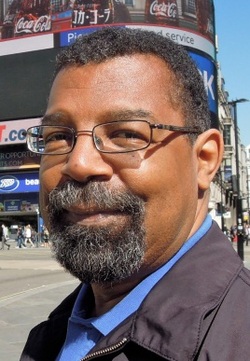 Tom Minter is a playwright specializing in work on issues of diversity, culture and national identity. He is also a librettist, and Teaching Artist, living in Washington, DC. Tom’s first theatre works were presented in London. His play Exposition was produced in the West End at The Arts Theatre in 1997. His groundbreaking theatre triptych, In Caliban’s eye, consisting of the plays The Orion, Breathing Ash and Reconstruction have received workshop presentations in Manhattan at the Working Theatre; The Manhattan Theatre Club; The Lark. His play Past is the present, Imperfect was produced in DC, by City Artistic Partnership. Most recently Tom was commissioned by the Smithsonian National Portrait Gallery to write Smoking Out The Beehive, a theatre work collecting the artistry and voices of 6 African American Poets, from the museum’s 2012 exhibition Poetic Likenesses. Smoking Out The Beehive premiered in 2013. Blues For A Royal Flush, a commission by Stanford University, in Washington, based on the work of DC native Duke Ellington, will premiere in 2014. Tom continues his work as a Teaching Artist, connecting DC students with experiences of theatre, while facilitating the journey in creating scripts out of their own ideals and stories. Playwright Jennifer L. NelsonJACQUELINE LAWTON: As a playwright, what excited you about taking part in African Continuum Theatre Company’s A Blaze of Horns: African American Voices in Brief? JLN: The short play form has become increasingly important in the 21st Century--perhaps because television has primed our attention spans for quick, pithy dialogue. It's important for the new ACTCo to demonstrate its intention to be recognized as a hub for pertinent local theatre artists and there's no time like the present! JL: What is the name of your play and what is it about? JLN: My play is "Talking with the Ex." It takes place in the middle of the night when a sleeping woman is awakened by an unexpected phone call from her former husband, the father of her child. Even though she is barely awake, he launches into an intricate story about someone that she barely knows. His presence over the phone becomes so intrusive that she experiences him actually entering her bedroom and climbing into the bed they used to share. JL: Why should folks come out and see A Blaze of Horns? JLN: I hope people who appreciate theatre will come for an entertaining evening that showcases the diversity of the area's working playwrights. JL: What are you working on next? Where can we follow your work? JLN: I'm in the middle of a play for families with young children called "A Mile in My Shoes" that will be workshopped and hopefully toured by a theatre ensemble from Bowie State in October. 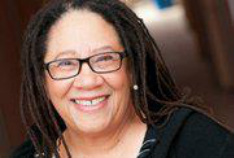 Jennifer L. Nelson is a playwright and director who was the Producing Artistic Director of ACTCo for eleven years. Her first full length play, Torn From the Headlines received the Helen Hayes Award for Most Outstanding New Play. Her musical play Torn from the Headlines was awarded the 1996 Helen Hayes/Charles MacArthur Award for Most Outstanding New Play. Her three-minute telephone play Somebody Call 911 was commissioned by and featured at the 2001 Humana Festival at the Actors’ Theatre of Louisville. Her latest full-length play 24, 7, 365 was produced by Theatre of the First Amendment. Her full-length musical Hubert & Charlie was honored by the 2003 Larry Neal Writers’ Awards and was subsequently produced by the African Continuum Theatre. She has received several commissions to write issue-oriented plays for young audiences, most recently by Ford’s Theatre to bring to life historical character Elizabeth Keckly (2011 Washington Post Helen Hayes Theatre Award). She has also been commissioned to write short plays for the Theatre Lab; Active Cultures/Sportaculture Festival; the Cultures-in-Motion Program of the National Portrait Gallery; the Education Department of the Corcoran Gallery; the Kennedy Center Program for Families; and Round House Theatre’s HeyDay Players. She is a three-time grantee of the DC Commission on the Arts Individual Artist program, and a recipient of the Mayor’s Arts Awards for Excellence in an Artistic Discipline. She is currently Artistic and Legacy Project Advisor at Ford’s Theatre. Playwright Malcolm PellesJACQUELINE LAWTON: As a playwright, what excited you about taking part in African Continuum Theatre Company’s A Blaze of Horns: African American Voices in Brief? MALCOLM PELLES: ACTco is an institution in DC, and it was an honor to be asked to participate. Also it's amazing to be grouped with the other playwrights, actors, and artists that are contributing to A Blaze of Horns. I jumped at the opportunity. JL: What is the name of your play and what is it about? MP: The name of my play is A Dead Mouse On Your Doorstep, and it's a comedy about a lifelong activist that stands up for his right to buy vegetarian cat food. On the surface it's a funny farce, but it also has deeper themes that center on how older activists try to pass the torch of struggle to younger generations. JL: Why should folks come out and see A Blaze of Horns? MP: Washington has a great variety of amazing Black voices that need to be heard. A Blaze of Horns is a good opportunity for audiences to experience the awesome talent this city has to offer in one evening. JL: What are you working on next? Where can we follow your work? MP: A new comedy web series that I wrote and produced called Among Thieves will debut in October atwww.AmongThievesTV.com, YouTube, and Blip.tv. Also you can follow me on Twitter: @malcolmpelles . 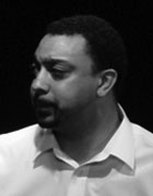 Malcolm Pelles is a playwright and filmmaker. His plays have been performed in Washington, DC at the John F. Kennedy Center for the Performing Arts, Rorschach Theatre, Warehouse Theater and Theater J; and in New York City at such places as the Atlantic Theater. He earned an MFA degree in dramatic writing from the Tisch School of the Arts at New York University. His new comedy web series Among Thieves debuts October 15th at WWW.AmongThievesTV.com. 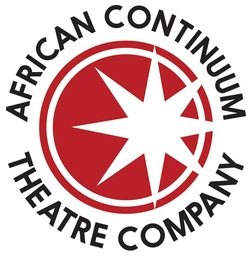 About African Continuum Theatre Company The African Continuum Theatre Coalition was created in 1989 as a service organization to assist the dozen or more small black community theatres in the improvement of the quality and visibility of their work. In 1995, the Coalition transitioned into a theatre company, with a primary mission to produce professional, high-quality programming for the general public that preserves and highlights African-American history and culture. African Continuum Theatre Company has presented over 35 fully-produced, main-stage plays, seven of which were world premieres, along with numerous public readings of new works by playwrights of color. African Continuum Theatre Company is committed to providing new and traditional performing art forms from main-stage productions to community engagement programs. Its focus and strength is engaging the community with exciting and meaningful theatrical productions, educational programs, partnerships, and volunteer opportunities that bring us to the larger community. African Continuum has garnered recognition for its artistic endeavors and leadership from the Cultural Alliance of Greater Washington and other agencies, including 16 Helen Hayes Awards nominations, 3 Helen Hayes Awards, the Washington Post Award for Distinguished Service to the Community, and the Mayor’s Arts Award. 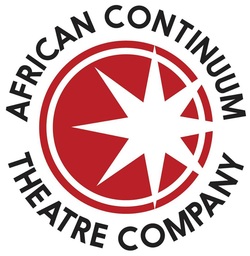 This Saturday, September 21st at 7:30pm, please join African Continuum Theatre Company for A Blaze of Horns: African American Voices in Brief, an evening of 10-minute play readings by six of your favorite local playwrights. Hosted by Patrick Washington of the Poem-Cees, playwrights include Michael J. Bobbitt, Paige Hernandez-Funn, Caleen Jennings, Tom Minter, Jennifer L. Nelson, and Malcolm Pelles. "A Blaze of Horns" is a phrase from a Sonya Sanchez poem entitled "Sequences." This phrase represents many distinct voices that come together to create a rich, harmonious sound," explained Artistic Director Thembi Duncan. "The Blaze of Horns reading series allows us to experience the myriad perspectives and interests of African-American playwrights, but in the short and challenging form of the 10-minute play. I felt it would be fitting for this event to occur on the evening of the H Street Festival, in order to extend the audience's experience from inside the theatre to outside, surrounded by the vibrancy of H Street, the place where African Continuum Theatre Company makes its home." A Blaze of Horns Saturday, September 21, 2013 at 7:30 pm Atlas Performing Arts Center 1333 H Street NW Suggested $15 Donation *Note: allow LOTS of time for travel. The H Street Festival will be held that same day, and H Street will not reopen for vehicles until 7:00pm.
Later today, I'm going to share interviews with the playwrights and directors about their work. Stay tuned!
I've had the extreme pleasure of working with the lovely, sharp and talented Azie Mira Dungey on a number of occasions. The recent attention and immediate success for her new web series Ask a Slave! comes as no surprise. Ask a Slave! is based entirely on the day-to-day encounters she had while working as a slave character at George Washington's Mount Vernon. The character of Lizzie Mae is a made up person, who did not live at Mount Vernon, but is inspired by the women she portrayed. This smart, witty, satirical look at race relations is a welcome and useful addition to current racial and social discourse. Click here to hear her recent interview NPR's Meghna Chakrabarti on Here and Now. Episodes One and Two have already been released. New videos will be released every Sunday. Make sure you don't miss a single one by subscribing here. Four more videos will be released in the series. Please enjoy Episode One: Meet Lizzie Mae. If you enjoyed this episode, please consider making a donation to Ask a Slave! by clicking here. To learn more about Azie Mira Dungey, the process and inspiration for Ask a Slave!, and a behind-the-scenes look at production, please enjoy this interview. 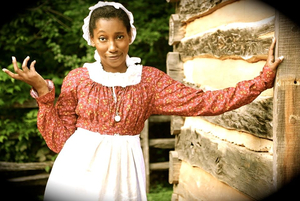 JACQUELINE LAWTON: Why did you decide to get into theater? Was there someone or a particular show that inspired you? AZIE MIRA DUNGEY: That is an easy question. I have always loved television and films. When I was a little girl, I watched The Carol Burnett show every night before bed. I spent most of my time writing stories and acting them out. This is how I entertained myself as an only child who did not attend preschool. What sealed the deal for me, so to speak, was a performance I attended with my mother. It was “Ragtime” at the Kennedy Center. My mother is not a fan of musicals, but I remember looking over to her in middle of Act II and her eyes were filled with tears. And I thought, “I want to do that.” I don’t mean that I wanted to make my mother cry. I wanted to make people connect with a story and find an emotional release--laughter, tears, what have you-- for the greatest purpose: to learn more about themselves, and each other, and grapple with this question of what it means to be human. For me, Ragtime did that. And it’s still my favorite show. JL: How long did you live and work as an actor in the D.C. area? What brought you here? AMD: I moved to Prince George’s County when I was 8 years old. I grew up mostly in College Park. I went to NYU, and soon after graduation, I came back. Honestly it was because I got married, and we decided to make a go of it there. It was a great decision and I enjoyed working in theatre there. I’ve lived in Los Angeles for about 9 months now. 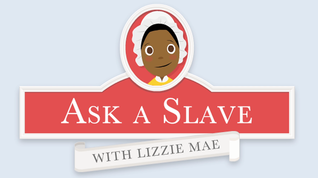 JL: You describe “Ask a Slave” as a new comedy web series hosted by the plucky Lizzie Mae, housemaid to George and Martha Washington. What inspired you to create this provocative, smart and humorous new show? AMD: I worked at Mount Vernon as a part-time day job for about two years. I actually quite enjoyed it, mostly because I loved the people I worked with and I love learning. The subject matter was horrifying, but the working experience was quite pleasant. The impetus for this series came from friends and family. I would tell them the stories of these crazy or disturbing or humorous interactions with visitors, and we would laugh or be incredibly angry together (many times both). They encouraged me to write it down, which I started doing. I had a conversation with the DC-area actress Jennifer Mendenhall while in her kitchen, and she was very insistent that I make a show about it. She was thinking theatre, maybe a one-woman show. As I ruminated over it, it became clear to me that it would work best on film because the questioners could sort of pop in and out, and my character would still be in control. I wanted to talk about these crazy Mount Vernon questions, not just to make fun of them or the experience I had, but also to give kind of a “checking-in” on where we are as a country with this. History is our narrative, it shapes what we think of ourselves and our society. How it is controlled, and whose stories get told (or not told) has a strong effect on culture, and even on public policy. These misconceptions about black history and the modern black experience is really dividing us politically and socially. If we don’t understand racism and where it comes from, how can we end it? How can we weed it out? We have to be critical of these things to make true progress. JL: What is a living history character? How is this different from playing a character from history in a film or play? AMD: I spent about two months in the MV library reading about the time period, and George Washington’s life, and the very specific stories of three enslaved women that I portrayed. That was amazing. I learned so much and I was eager to give that knowledge away. Living history can be very effective, but it is also very strange. The strange part is that you are kind of caught between actor and educator, and you are put in situations that this person you are playing would never have experienced. Caroline Branham, Mrs Washington’s Lady’s maid, would never have been sitting in a Greenhouse sewing shirts and talking to a school group from Ohio that keeps trying to explain to her what a cell phone is. So it can be very frustrating and awkward. I should say that MV actors don’t do living history, exactly. At Williamsburg, you will see living history, because they are living as a town in that time, and you, as a visitor, walk into that world. At Mount Vernon, there were maybe 5 of us, and on any given day, perhaps 1-3 of us working at a time, and we were the only ones “living” in 1797. We were really just there to answer questions. I did not wash clothes, or dye wool or fetch tea for Mrs. Washington. I was a “housemaid” who wasn’t even allowed to be in house because it is a museum! So that is why is was all about the questions. 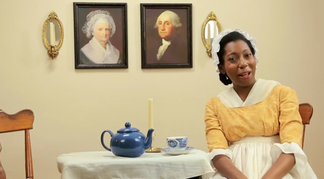 JL: What do you love about playing Lizze Mae? What is the most challenging part of bringing her to life? AMD: Lizzie Mae is just great. I love playing her. (I mean, I wrote her!) I love that she is candid but thoughtful, and gracious. I think she is very classy, though she is a low-status person. That is something that I believe is a part of the African American female experience: Having to find grace and dignity in yourself and your life in a world that thinks you are less than a man, and even less than a human. That was actually also the most challenging. To tow the line between her own high sense of herself and her inherent oppression. People at MV often asked me if I (my character) was happy. I would say “People like me aren’t given happiness in this life, we have to make it.” I wanted to make sure that came across. She can find laughter and goodness in a moment, but she is living in the pain and horror of slavery. Another issue was making sure that she did not become a minstrel show. I don’t think I have to get into that. We all know what I mean. But she is not the butt of the joke. Her speech patterns, her looks, her situation is not what makes the comedy. It’s the ignorance and misconceptions of others that bring the laughs. That was very important. 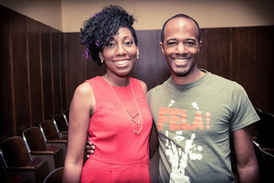 Azie Dungee and Jordan Black (Director) Azie Dungee and Jordan Black (Director) JL: What is the process of creating a web series? Who are your collaborators? How long does it take from when you’ve written an episode to when it’s finished and ready? AMD: For me it started with the writing. I wasn’t going to do anything until I was very comfortable with the scripts. And that took a lot of effort because it’s such a delicate process, finding humor with slavery staring you in the face. Slavery is not funny, and no one should try to make it so. The script underwent many revisions. The director, Jordan Black, is a phenomenal person and artist. He was on-board from the moment I contacted him (with no introduction) on Facebook. He is the creator of a show at the Groundlings called “The Black Version” which is an all-black improv show that is one of the most popular comedy shows in LA. I am a student at the Groundlings, and a mutual friend, a brilliant actress named Katierose Donahue told me about him. He really pushed the script in the right direction, impressing upon me that I should focus focus focus on the questions. He pulled in many of the actors you see in the show from the Groundlings Sunday Company that he directs. I couldn’t have been happier with his work. We shot all the content for six episodes in two days, with about 2 1/2 hours on a third day for pick-up shots. Ryan Moulton was our DP and editor. He is fantastic. One day we shot all of the “Questions” right outside of the Groundlings Theatre on Melrose Ave in West Hollywood. People came in 10-20 minute blocks. Our Production Manager Pamela Peters kept us on schedule. The second day was shooting the “Guest Appearance” scenes, like the one with the abolitionist and all of my answers. We didn’t even know which Q&A would go where. We just shot it and then later collaborated on how to situate the content within the episodes. Then Ryan cut it all six episodes. Johnny, my husband, did the sound, and Jamie Noguchi, who is a fabulous visual artist and comic book author, made the cute animated intro. We shot it and went through several drafts of the editing and such, and all in all it was about 2-3 months. JL: On the show, different people ask Lizzy Mae questions about her life. Issues of race and race relations are addressed with great candor and wit. Where do you get these questions? AMD: The questions were word for word what I was asked while working at Mount Vernon. You really can’t make this stuff up. A few of the actors used their amazing improv skills to come up with some questions while we were shooting. About 3 ended up in the series. I only chose them if they were close to something I remembered being asked. For instance the one about face products. She made that up on the spot. People were always commenting on my skin being so pretty. I did tell a woman, “You don’t want this skin. It hasn’t done me any good.” JL: If there is one thing you want audiences to walk away knowing or thinking about after experiencing Ask a Slave, what would that be? AMD: Read a book. That is all I ask. Really a book. No, really, on a serious not. One thing I notice at Mount Vernon was how visitors felt such strong and immediate affinity to George Washington and his story. And rightly so, he deserves it. However, in this series, I hope people begin to feel that same passion for the Lizzie Maes of history as well. Her history belongs to all of us as well. I wish people would see America differently. We made this country together. White, black, American Indian, and everyone else. When I look at my family history, which I know back to the 1690s, that is what I see. We need to have an interest in everyone’s American story. Black history is not a separate history or a less important one. We have been here from the beginning. We are America, too. JL: Where can we watch new episodes of “Ask a Slave?” AMD: Please subscribe to our "Ask a Slave" youtube channel. There are two episodes up now. We will post one new episode per week. They will also be posted on the web site AskASlave.com and our Facebook page. JL: How can we support “Ask a Slave” to make sure this wonderful new series continues? AMD: Well, I would love to make more than our initial 6 episodes, but I am currently out of funds. If you would like to see more, please give to our gofundme page.  AZIE MIRA DUNGEY Azie is an actor/writer living in Los Angeles. She is from the Washington, DC area where she worked in both historical interpretation and professional regional theatre, performing in shows at the Smithsonian, Folger Shakespeare Theatre, and the Studio Theatre, one of which earned a Helen Hayes nomination. She is soon to be featured in the upcoming web series Josie and Dale, directed by Mark Rutman. Azie is a graduate of NYU Tisch School of the Arts, and is currently studying at the Groundlings Theatre and School.  On Monday, September 2, 2013 at 3:00pm, African Continuum Theatre Company opens the 2013/14 Season of the Phoenix with a reading of Producing Artistic Director Thembi Duncan's new play, Mon Chaton as part of the 12th Annual Kennedy Center Page-to-Stage Festival. The reading, which will be directed by Thembi Duncan, features Tricia Homer, Audra Polk, Patricia Dugueye, Carolyn Agan, Kendell Lee, Justin Fair, and Matthew Sparacino. This event is free and open to the public. It will take place at the Family Theater. For more information, visit: http://www.kennedy-center.org/events/?event=XNPTS 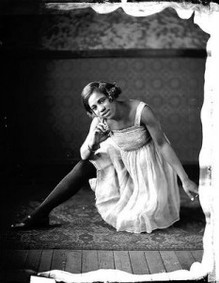 About the play Summer, 1926. A country schoolteacher inherits a Harlemboardinghouse from her worldly, sophisticated aunt and finds herself caught in a whirlwind of enthralling characters and events that teach her more about herself than she ever imagined. Mon Chaton is one of the untold stories of lesbians and gays during the period that came to be known as the Harlem Renaissance. I had the opportunity to speak with Thembi about her writing process and the inspiration for her new play. 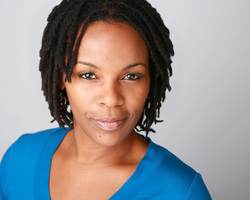 JACQUELINE LAWTON: Why did you decide to get into theatre? Was there someone or a particular show that inspired you? THEMBI DUNCAN: Back in 1998, I took an acting class at the local recreation center for fun. The culmination of the class was a performance of the children’s play Yours Truly, Jack Frost. I played Evilina Muggleworth, the head of an advertising agency that would do anything to make money. I took such pleasure in playing that deliciously dastardly character that I began to look for more opportunities to embody various personas on stage. Shortly thereafter, I pursued more formal training in acting and movement, and then I and began to audition all over town. I landed a couple of roles, things began to snowball, and I found myself enveloped in the world of theatre. Once I figured out that I could actually get paid to act, that was all she wrote. I was hooked. Poetry was my thing since elementary school, but after acting for a few years, I decided to try my hand at writing plays. I didn’t want to complain that someone else wasn’t writing the stories I wanted to see. I figured, why not write them myself? JL: Next, tell me a little bit about your writing process. Do you have any writing rituals? Do you write in the same place or in different places? TD: I prefer to write at home, where I can hold loud conversations with my characters with minimal outside judgement or intervention. I have a large, rectangular wooden table where my laptop lives. A friend calls it the “Last Supper” table. It’s big enough to spread drafts and notes everywhere, so that I always have my ideas at arm’s length. When it comes to editing drafts and revising, however, I prefer Cosi or Panera Bread. A specific Cosi, and a specific Panera Bread. And I like to sit at the same table. I give people the stink eye if they’re sitting at my table when I come in. JL: Describe for me all the sensations you had the first time you had one of your plays produced and you sat in the audience while it was performed...what was different about the characters you created? How much input did you have in the directing of that work? TD: As a rule, I try to stay out of the director’s hair unless she/he asks me a direct question. I try. I have had several short plays produced, and the first time I sat in the audience and watched one, I was somewhat confused, because a lot of what was going on in my head was not necessarily communicated through the work. Not saying that’s a bad thing, because the piece was still well done, it simply didn’t turn out the way that I’d imagined. The actors imbued the characters with qualities that I hadn’t considered, the director had a vision, and so on. I also learned to think about how effectively I communicate my ideas through the work itself. That’s definitely my biggest challenge. JL: What do you hope to convey in the plays that you create--what are they about? What sorts of people, situation, circumstances, do you like to write about? TD: I like to make opposing ideas crash into each other. I like to educate and create nostalgia. I write about people with quirks, people with weaknesses. People who defy categories and assumptions. I write mainly about women and African-Americans, but several of my characters have no particular race. I write stories that will create images that I want to see on stage. Images that we don’t see often enough – women and people of color as main characters, heroes, complex beings, with agency over their own destinies. I am thinking these days about being more theatrical. Getting away from writing that stages like TV or film, which is hard. I want to give people a compelling reason to get off their couches and go sit in a dark building with no windows. JL: What inspired you to write Mon Chaton? TD: In 2009, I was at the University of Maryland in my last semester of finishing my undergraduate degree in Theatre (it’s never too late, kids!). I decided to write a play as an Independent Study, so I worked with Dr. Walter Dallas on The New Negro, which was the original title of the play, based on the 1925 anthology of the same name by Alain Locke. My fascination with the Harlem Renaissance led me to the subject matter – but I was interested in the average, everyday people who lived amongst the renowned artists that we often associate with that era. JL: Why is this story relevant for today’s audience? TD: Anyone engaged in the current public discourse on LGBT equality will be interested in this piece. Everyone else will (hopefully) appreciate it for its exploration of the complexities of love and identity in that particular space and time. Some people consider LGBT issues a modern phenomenon, as if gays and lesbians were invented in the 80’s. The fact that there was a thriving LGBT scene in Harlem in the 1920’s was interesting to me, and I wanted to share some of those stories, based on my exhaustive research of the period. Audience members have cornered me, asking how much of the play I “made up,” and the answer is very little. Nothing is new under the sun. About the Playwright A native of the Washington D.C. area, Thembi Duncan has performed as an actor in the region for almost fifteen years. As an emerging playwright, she penned Gridiron: Adventures from the Sidelines,for the Active Cultures 2011 Sportaculture Play Festival, which was re-produced in the Best of Sportaculture Festival later that year. Champagne, her 15-minute play commissioned by The Brave Soul Collective, was performed for National Black AIDS Day 2012, the 2012 National Black Theatre Festival, and the 2012 International AIDS Conference. She wrote Coop in the Yard for Active Culture's Govaculture offering in the Atlas Intersections Festival, and BLUEP for Rorschach Theatre's Klexography Festival. Mon Chaton is her first full-length play, which was first developed in 2009 under the tutelage of Dr. Walter Dallas at the University of Maryland, and has had successful staged readings in D.C. and Virginia. Her cross-gendered adaptation of the cult classic film Whatever Happened To Baby Jane?, called WTF Happened To Baby Sister?, will receive a workshop performance in February 2014 as part of the Mead Theatre Lab Program. Thembi serves as Lead Teaching Artist at historic Ford’s Theatre, and also serves as Producing Artistic Director of African Continuum Theatre Company.  About African Continuum Theatre Company The African Continuum Theatre Coalition was created in 1989 as a service organization to assist the dozen or more small black community theatres in the improvement of the quality and visibility of their work. In 1995, the Coalition transitioned into a theatre company, with a primary mission to produce professional, high-quality programming for the general public that preserves and highlights African-American history and culture. African Continuum Theatre Company has presented over 35 fully-produced, main-stage plays, seven of which were world premieres, along with numerous public readings of new works by playwrights of color. African Continuum Theatre Company is committed to providing new and traditional performing art forms from main-stage productions to community engagement programs. Its focus and strength is engaging the community with exciting and meaningful theatrical productions, educational programs, partnerships, and volunteer opportunities that bring us to the larger community. African Continuum has garnered recognition for its artistic endeavors and leadership from the Cultural Alliance of Greater Washington and other agencies, including 16 Helen Hayes Awards nominations, 3 Helen Hayes Awards, the Washington Post Award for Distinguished Service to the Community, and the Mayor’s Arts Award. |
My BlogI'm a playwright, dramaturg, and teaching artist. It is here where you'll find my queries and musings on life, theater and the world. My posts advocate for diversity, inclusion, and equity in the American Theatre and updates on my own work. Please enjoy!
Categories
All
Archives
June 2020
Reading List
|

